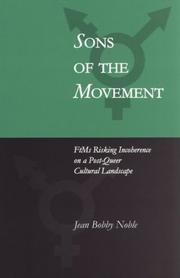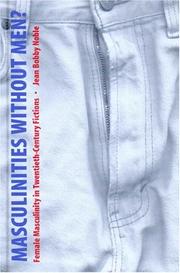| Listing 1 - 2 of 2 |
Sort by
|

ISBN: 1459321758 143560413X 9781435604131 088961461X 9780889614611 9781459321755 0889615594 Year: 2006 Publisher: Toronto Women's Press
Abstract | Keywords | Export | Availability | Bookmark
 Loading...
Loading...Choose an application
- Reference Manager
- EndNote
- RefWorks (Direct export to RefWorks)
Female-to-male transsexuals. --- F to Ms (Female-to-male transsexuals) --- F2Ms (Female-to-male transsexuals) --- Female transsexuals --- FTM transsexuals --- FTMs (Female-to-male transsexuals) --- Trans men --- Transmales --- Transmen --- Transsexual males --- Transsexual men --- Transgender men --- Transsexuals

ISBN: 0774809973 9780774809962 0774809965 9780774809979 9780774851893 0774851899 128313120X 9781283131209 0774809965 9786613131201 6613131202 Year: 2004 Publisher: Vancouver, B.C. UBC Press
Abstract | Keywords | Export | Availability | Bookmark
 Loading...
Loading...Choose an application
- Reference Manager
- EndNote
- RefWorks (Direct export to RefWorks)
Conventional ideas about gender and sexuality dictate that people born with male bodies naturally possess both a man's identity and a man's right to authority. Recent scholarship in the field of gender studies, however, exposes the complex political technologies that construct gender as a supposedly unchanging biological essence with self-evident links to physicality, identity, and power. In Masculinities without Men? Jean Bobby Noble explores how the construction of gender was thrown into crisis during the twentieth century, resulting in a permanent rupture in the sex/gender system, and how masculinity became an unstable category, altered across time, region, social class, and ethnicity. This groundbreaking study maps historical similarities in fictional, cultural, and representational practices between the periods of modernism and postmodernism. Noble examines nineteenth-century sexology, drama, and trial transcripts, and late twentieth-century counter-cultural fiction, popular film and documentaries, and theoretical texts. Among the works analyzed closely are texts that have been the focus of lesbian, queer, and feminist theory: Radclyffe Hall's The Well of Loneliness, Leslie Feinberg's Stone Butch Blues, and the film Boys Don't Cry. These, as Noble illustrates, make use of similar types of narratives, structures, and thematic techniques to articulate female masculinity. Also included is an exploration of Rose Tremain's Sacred Country, which has never before been studied within this context. Through a critical examination of these texts, Noble demonstrates that trans-gendered and trans-sexual masculinity began to emerge as a unique category in late twentieth-century fiction, distinct from lesbian or female masculinity. Of interest to scholars and students with an interest in sexuality and gender studies, Masculinities without Men? also makes a vital contribution to literary criticism, as well as to cultural and film studies.
Gender identity in literature. --- Lesbianism in literature. --- Masculinity in literature. --- Fiction --- Women in motion pictures. --- Motion pictures --- Masculinity (Psychology) in literature --- History and criticism. --- Gender --- Homosexuality --- Identity --- Female homosexuality --- Literature --- Masculinity --- Theory
| Listing 1 - 2 of 2 |
Sort by
|

 Search
Search Feedback
Feedback About UniCat
About UniCat  Help
Help News
News